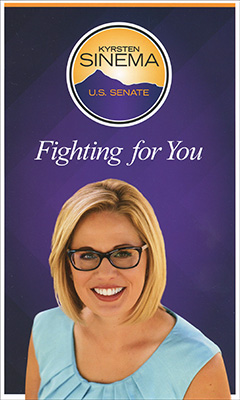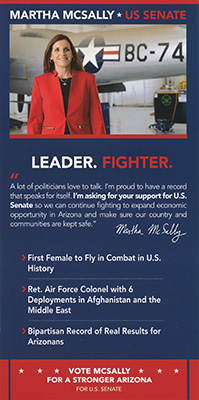- Main
Page « 2018
Senate Races «
Arizona
Senate
| ARIZONA |
Nov. 6,
2018 U.S. Senate |
|
Plurality: 55,900 votes (2.34 percentage points) AZ
Secretary of State
DEMOCRATIC PICK-UP Notes: Sen. Jeff Flake (R), one of few Republican officials critical of President Trump, announced he would not seek re-election on Oct. 24, 2017 in a speech on the Senate floor (>). At that point it appeared likely he would be defeated in the primary by conservative Kelli Ward. However, U.S. Rep. Martha McSally (R) entered the race, formally announcing her candidacy on Jan. 12, 2018. The Aug. 28 primary contest was very contentious, but McSally won by a comfortable margin (357,626 votes to 180,926 for Ward and 116,555 for former Sheriff Joe Arpaio). There was not much of a Democratic primary contest; U.S. Rep. Kyrsten Sinema easily defeated civil rights attorney Deedra Abboud. The third candidate on the November ballot was Angela Green (G). Sinema announced her campaign on Sept. 28, 2017 (>). She was elected to Congress in 2012, representing the 9th CD (in Maricopa Co., including "Tempe, southern Scottsdale, western Mesa, northwestern Chandler, and southern Phoenix"). Previously she served as a state legislator. She started in politics on Ralph Nader's 2000 presidential campaign. McSally was elected to represent the 2nd CD (SE corner of the state including a significant part of Tucson) in 2014 after a distinguished career in the U.S. Air Force. There was just one debate between the two major party candidates, on Oct. 15 in Phoenix (>). On Nov. 1 Green dropped out and endorsed Sinema. In 2016, when the GOP registration edge was 4.13 percentage points, the Clinton campaign made a late play for Arizona, but Trump ultimately carried the state by 3.54 percentage points (+). For the Nov. 6, 2018 election, the Republican registration advantage was somewhat reduced to 3.68 percentage points: of 3,716,161 registered voters, 1,288,332 were Republicans (34.67%), 1,151,745 were Democrats (30.99%), 1,238,038 had no officially recognized party preference (33.31%), and Libertarians and Greens accounted for the remaining one-percent. Trump held one of his MAGA rallies in the state, on Oct. 19 in Mesa (+). McSally led narrowly in Election Night results—a campaign tweet from wee hours of the morning of Nov. 7 stated, "A great night for Arizona— heading to bed with a lead of over 14,000 votes..." However, as the votes continued to be counted Sinema gained ground, pulling ahead on Nov. 8 and building a lead (+). McSally conceded on Nov. 12. A post-election memo from the McSally team (>), posted by the Washington Post, identifies many factors that contributed to Sinema's win. For example the memo notes that Sinema was able to start general election advertising in April while McSally was still engaged in her primary, resulting in "a 20-week advertising advantage where she [Sinema} was able to successfully cement a moderate, independent image." According to the memo, general election media spending for Sinema totalled $36.3 million (campaign $15 million and outside $21.3 million) compared to $28.5 million for McSally (campaign $5.85 million and outside $22.6 million). Open Secrets reports the Arizona race was the fifth most expensive Senate race of the cycle, tallying $105.5 million, $44.6 million spent by the campaigns and $60.9 million by outside groups (>). Sinema's Maricopa Co. base may have been a factor; 60.34 percent of total ballots cast in the election were from Maricopa Co.. The last time a Democrat was elected to the U.S. Senate from Arizona was Dennis DeConcini, who won a third term in 1988, but did not seek re-election in 1994. Despite McSally's loss in the election, she will end up in the Senate in the 116th Congress. On Dec. 18 Gov. Doug Ducey announced that he would appoint her to fill the McCain seat being temporarily being held by Jon Kyl, effective January. Campaign Managers: Kyrsten Sinema: Andrew Piatt (Oct. 2017) Deputy political director at the DSCC in 2016. Previously Southern regional political director at the DCCC, announced Feb. 2013 and into 2016; worked for the DCCC's IE in 2012. Experience also includes campaign manager on U.S. Rep. Mark Schauer's (MI) unsuccessful 2010 re-election bid. Martha McSally: Jim Bognet, CEO (July 2018) Senior vice president at The Glover Park Group, Jan. 2016-April 2018. Managing director of JRB Strategies (Los Angeles), Mar. 2013-Jan. 2016. Media consultant for Romney for President, Inc. Aug.-Nov. 2012. General consultant (Nov. 2011-Aug. 2012) and campaign manager (July-Oct. 2011) on David Dewhurst for U.S. Senate (TX). Media consultant at The Stevens and Schriefer Group, 2010. Campaign manager on Steve Poizner for Governor (CA), 2009-10. Policy development director on Romney for President, 2007-08. Policy director on Californians for Schwarzenegger, 2006. Chief deputy special advisor for jobs and economic growth to Gov. Arnold Schwarzenegger, 2003-06. Investment banking associate, 1997-98. J.D. from UCLA School of Law and M.B.A. fomr UCLA Anderson School of Management, 2003; B.S. in finance from Penn State University, 1997. and... Martha McSally: Stephen B. Shadegg, Campaign Manager (Jan. 2018) Director of outreach in the Arizona Attorney General's office from Jan. 2017. Deputy campaign manager on John McCain 2016 from Sept. 2015. Consultant, Jan. 2014-Sept. 2015, and regional political director on Monica Wehby for U.S. Senate (OR) from Aug. 2014. Campaign manager on Fred Simon for Congress (CA), Sept. 2013-Jan. 2014. Account executive at Infincom, Nov. 2012-April 2013. J.D candidate at Phoenix School of Law; B.A. in political science from University of Arizona, 2009. See also: Archives of Women's Political Communication at Iowa State University: Krysten Sinema | Martha McSally. |
ADVERTISEMENT



